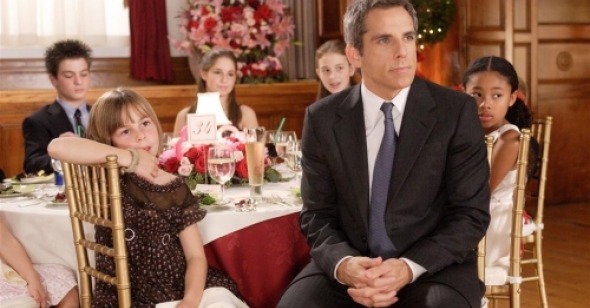Assimilation Complete
By Sarah Silver
The Heartbreak Kid
Dir. Bobby and Peter Farrelly, U.S., DreamWorks
In 1972, Elaine May boldly cast her own daughter, Jeannie Berlin, as the slightly obnoxious, peccadillo-riddled Lila Kolodny, a good Jewish girl who rushes into marriage with Lenny Cantrow (Charles Grodin) and, through a series of claustrophobic vignettes, begins to grate on the nerves of both Lenny and the audience. May’s devastating “comedy,” The Heartbreak Kid, cranks the cynicism knob about 100 notches past the mark left by her former collaborator Mike Nichols’s 1967, The Graduate. Although it may seem logical that the Farrelly brothers, themselves famous for their own, more insipid, brand of discomfort, would look to Elaine May for inspiration, by going so far as to remake May, they have added nothing and subtracted plenty, draining the exquisitely uncomfortable tale of perpetual discontent and religious and economic upward mobility of all of its dark, awkward intimacy. As (inadequate) recompense, the directors have “Farrelly-ed” up, the whole affair, replacing the suggested with the blatant, the realistic with the exaggerated.
In fact, drained is a word that suits this remake well, for, even if its colors are pumped-up in comparison with the Seventies fade of the original, it’s as if all feeling and introspection had to be sucked out in amounts proportionate to its superfluous cosmetic revamping. The original film is book-ended by Cantrow’s two weddings: the first nuptials, with Lila, are all mazel tov and stomped-upon glass, while the second ceremony (a marriage to WASPy ice-princess Cybill Shepherd) is performed under a huge cross hanging on the wall. The Farrellys have opted to extract all Jewishness from the screenplay, and it almost feels like they would appreciate a pat on the back for this progression, as if culturally and religiously neutralizing the characters would somehow result in more forward-thinking comedy. This time around, Cantrow leaves his sex-crazed blonde bombshell of a wife for a simple Midwestern brunette. That’s insurance against claims of misogyny, right?
Actually, by removing the implication that Lenny (called Eddie in the new version) is lusting after an unobtainable blonde shiksa while honeymooning with his frumpy Jewish wife, the brothers have effectively neutered the film. And by erasing all traces of distinguishing cultural traits from the female leads, and replacing them with wan and unbelievable back-stories, they have made two infinitely less nuanced female characters.
Other inexplicable changes, which ultimately end up detracting from the film’s supposed meaning, seem like nothing more than attempts to set the remake apart from the original. For instance, here Cantrow’s object of desire, Miranda, (the innocuous Michelle Monaghan, admittedly given little to do), is unaware of the fact of his being married. In the original, he tells Shepherd’s Kelly early on, adding a complex dynamic to their relationship as well as speaking volumes about the character of the shiksa, who continues to tease and taunt, regardless of his marital status.
In addition to these seemingly arbitrary wrenches thrown into the works, the Farrellys naturally amp up the gross-out factor every chance they get, which, in this film, only alienates us from characters that were, originally, painfully easy to identify with. For example, take the scene from the original in which Lila rhapsodizes over the deliciousness of her egg salad sandwich, as it dribbles on her chin (we don’t actually see her dribble, but rather May tastefully cuts back to her with egg on her face). There’s a moment of sheer terror as we scrutinize Lenny’s face; is he feeling the queasiness that we’re feeling, or will he come to accept Lila’s minor character flaws with the grace of a mature, loving man? Grodin’s performance is subtle enough (at least compared to Stiller’s); he’s neither a monster nor an idiot. In fact, he even shows a slight propensity towards sentimentality and a healthy sense of humor, so there exists the possibility (unfulfilled) of his eventually coming around to Lila.
When given the Farrelly treatment, this moment becomes more explicit: liquids squirt out of Lila’s nose due to her deviated septum. This deformity is later explained in a bit of sordid back-story (it turns out she is a former coke addict who appears to be both a liar and a freeloader). We also learn that the couple was married under false pretenses; the “job” that threatened to transfer Lila out of the country is actually a flimsy volunteer position. This not only allows Stiller to loathe Lila more than Grodin could ever hate the sweetly cloying Ms. Berlin, but also forces the audience to let him off the hook. After all, she tricked him into marrying her and didn’t reveal the details of her past, thus we no longer have to care about her feelings.
The Farrelly remake sucks all of the soul and much of the meaning out of The Heartbreak Kid, even lessening the title’s intended ambiguity. The original leaves us wondering if the title refers to Cantrow as breaker of women’s hearts, or if it’s more of a wink to his perpetual state of heartbreak—does he die a little more inside each time he knocks a woman off a pedestal? Stiller’s Cantrow isn’t given much time to contemplate his state between queef jokes and urination stunts, so the latter interpretation is less apparent. However, perhaps the Farrellys offer something completely new, with the title most accurately describing the Elaine May fans in the audience who just sat through this dreck.
